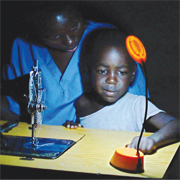 I talk a lot about how One Mango Tree jobs are empowering women in Northern Uganda. Sometimes the listener gives me a sort of twisted up grimace - perhaps a little jaded by the word "empowerment."
I talk a lot about how One Mango Tree jobs are empowering women in Northern Uganda. Sometimes the listener gives me a sort of twisted up grimace - perhaps a little jaded by the word "empowerment."Here's a little story.
One Mango Tree is lucky enough to have some generous partners. One day I was chatting with one of them about the tailors' needs, and I mentioned the horrible electricity situation in Gulu (we often lose power for days at a stretch). Our tailors, like most people in the developing world, rely on kerosene lanterns to light their homes - spending as much as 30% of their disposable income on fuel for the lanterns.
I'd just returned to Gulu from a camping trip, where my boyfriend showed me a solar light he picked up in Kampala. The Firefly, made by Base Technologies, is a powerful LED lamp with a flexible neck - you can sit it on the table, hang it from the wall, etc. I mentioned this light to our partner, and he suggested raising funds to give each tailor a Firefly for their home.
A few days later, I charged up my Firefly in the sun and took it into the workshop. I didn't even make it in the door when I was stopped by Alanyo Milly, our cook. She was inquisitive, so I did a 2-second demo (read: turned on the lamp). She immediately asked how much it cost (46,500 Ugandan shillings - about $25 - for the model that also charges your mobile phone), and then told me to bring her one from Kampala.
As I demonstrated the light in the workshop, Prisca started a list for orders. The idea of a partner raising funds to give free lights quickly dissipated. These ladies saw something they wanted to buy, and used their disposable income to make the purchase.
Okay, you may be thinking, "so what? I do that every day." In Northern Uganda, this little scenario is a really big deal.
On that same trip where I encountered the Firefly, I also read Out of Poverty, by Paul Polak. Within the first few pages of the book, Polak explores the issues that make the above scenario such a big deal: the faulty view that charity and handouts can end poverty. In Northern Uganda, more than twenty years of conflict brought countless donors and NGOs into the region, supplying everything from food handouts to break dance classes. This is a region used to receiving "free stuff." While many handouts were a necessity during the emergency period, the mentality of "something for nothing" has unfortunately persisted - to the detriment of the Acholi people.
One Mango Tree tailors make a great living. They know that if they work hard, they will continue to receive a paycheck each month. As a result, they've begun to change their thinking. Instead of waiting for One Mango Tree to give them light, they saw something they wanted and bought it themselves - not even flinching at what once would have been a prohibitive price tag.
Now that, to me, is empowerment.
Share


1 comment:
Ending Extreme Poverty - One Job at a Time!
Post a Comment